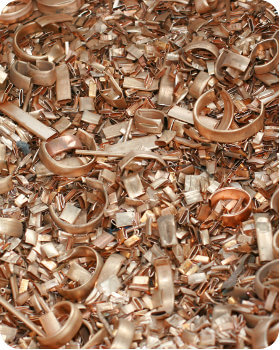Copper
Why Recycle?
Copper by itself or in any of its alloys is completely recyclable and can be processed over and over again with no loss of quality. Excluding wire production, which requires newly refined copper, about 75% of all copper-based products are made from recycled copper. Recycling copper can reduce the emissions and energy output compared to the mining, milling, smelting and refining of new copper material. When cooper is placed in landfill this is a waste of natural resources and economic resources – as recycled copper is worth up to 90 percent of the cost of the original copper.
Recycling Options
Copper is a cost-effective material to recycle and there are a numerous commercial metal recyclers in Australia that will purchase scrap for market price.
What Happens When It’s Recycled?
When copper scrap is received for recycling it is inspected and graded. Scrap material is melted and in some cases brought to higher purity while molten. Chemical analysis checks the purity level of the copper and the molten copper is cast into shape such as a cake or ingot for further processing. Copper alloy scrap has to be segregated, kept clean and identified so that the alloying elements and impurity content of each batch are known. Cooper alloys are then melted together into batches of known composition, some with virgin material so that the recycled material has the alloy composition desired.
Copper cable
Why Recycle?
Electrical cables are generally composed of a metal conductor inner housed in a plastic insulation. Recycling cables aids in the resource recovery of both the metal and the plastic outer for reuse. The most common metals used are copper and aluminium. When recycled these metals don’t degrade which means they can be recycled indefinitely. Using recycled metals results in a reduction of emissions compared to producing them from raw materials. Copper, aluminium and oil (from which plastic is derived) are all finite resources, so recycling helps preserve our natural resources.
Recycling Options
Most scrap metal recyclers will accept all types of metal electrical cables. This service can be provided through a collection box on-site or drop-off points at the facility. Metal recyclers will pay market price for the metal contained within the electrical cables. E-waste recyclers will also accept electrical cable for recycling, through both collection and drop-off services.
What Happens When It’s Recycled?
Recycling plants will granulate and then separate the metal from the insulation. Using this process, the plastic is removed and the copper, aluminium or other metals present are separated magnetically for recycling. These metals are then smelted for reuse in new metal products. Similarly the plastic is melted and extruded for reuse.


